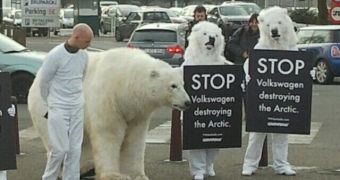The 2012 Brussels Motor Show is one of the most prestigious auto events, gathering all important players. Earlier today, it hosted an unusual protest that embarrassed Volkswagen officials.
Dozens of Greenpeace campaigners managed to turn heads during the show, wearing polar bear costumes, in an attempt to slam Volkswagen's unsustainable practices and send a powerful message to the entire industry.
Protesters have suggested that the giant company is using its influence to undermine a new legal framework proposed by the EU, seeking to curb the amount of greenhouse gas emissions and boost the market of earth-friendly cars.
Moreover, instead of greening up transportation and shifting the auto industry from a dirty and costly oil addiction, Volkswagen's actions are blamed for feeding this dependency.
Furthermore, lobbying could postpone effective regulations coming from the EU, while also favoring drilling operations developed in fragile ecosystems, like the Arctic.
Activists think unveiling new green cars displaying incredible emission standards is Volkswagen’s way of preserving its reputation, as one of the powerful large companies dictating the trends in the auto industry.
“Volkswagen’s inefficient, polluting cars are destroying the Arctic. While it might make one or two self-styled green cars, these are nothing more than PR for the bigger vehicles it is flooding the market with. Its shameful lobbying efforts are helping drive the search for oil into areas like the Arctic, where a spill would be catastrophic,” explained Sara Ayech, a Greenpeace climate campaigner.
This creative method of opposing lobbyism has managed to turn the auto event into a real show, as some costumed activists were dangling from the ceiling, just meters above the head of the participants.
A low carbon law implemented by the EU is expected later this year, in an attempt to lower harmful emissions to 95 grams of carbon dioxide per kilometer over the next eight years.

 14 DAY TRIAL //
14 DAY TRIAL //